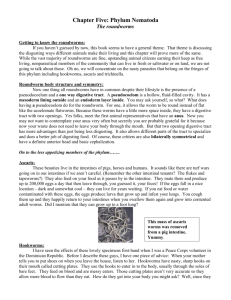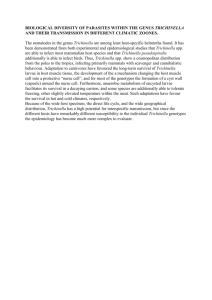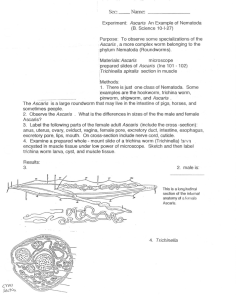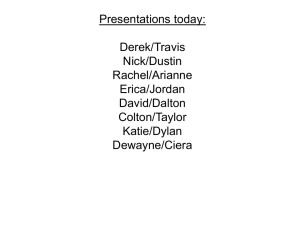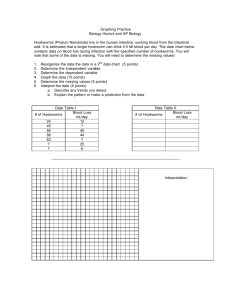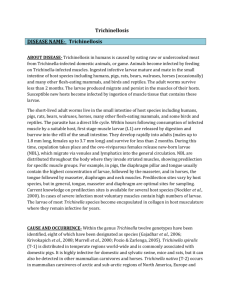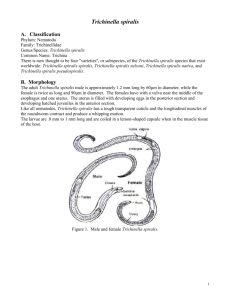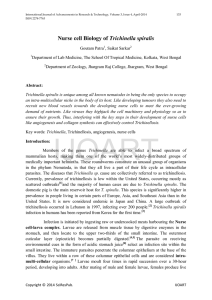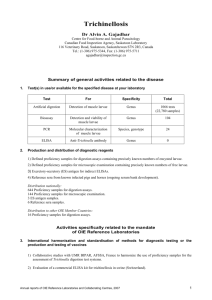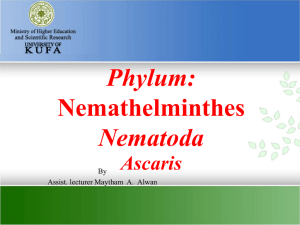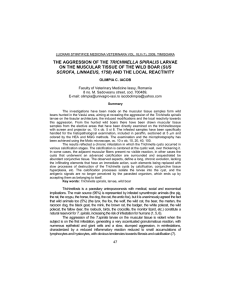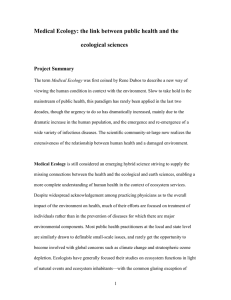Nematoda
advertisement
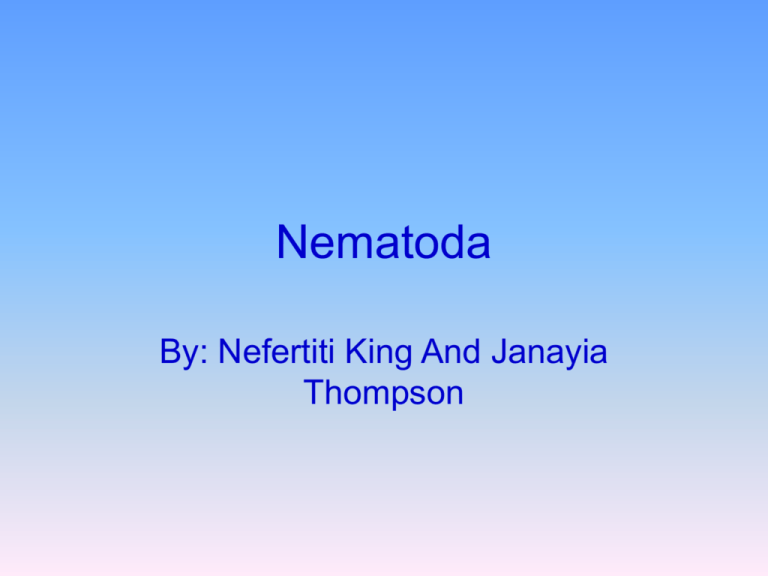
Nematoda By: Nefertiti King And Janayia Thompson General characteristics • The skin isn’t composed of cells it’s a mass of cellular material and nuclei w/o sep. membranes • Fossils date back to 354 to 290 million years ago • The body is long and narrow http://www.ucmp.berkeley.edu/phyla/ecdys ozoa/nematoda.html http://animaldiversity.ummz.umich.edu/site/ accounts/classification/Trichinella_spiralis. html#Trichinella spiralis Hookworms Kingdom Kingdom: Animalia Phylum: Nematoda Class: Secernentea Order: Strongiloidae Family: Ancylostomatidae Genus- Ancylostoma Species- Ancylostoma duodenale Ascaris Kingdom Kingdom: Animalia Phylum: Nematoda Class: Secernentea Order: Ascaridida Family: Ascarididae Genus: Ascaris Species: Ascaris lumbricoides Trichinella Kingdom Kingdom: Animalia Phylum: Nematoda Class: Adenophorea Order: Trichurida Family: Trichinellidae Genus: Trichinella Species: Trichinella britovi Trichinella Trichinella usually grow up to ¼ inch and they live inside of animal Found in Mexico, northern hemisphere southern Asia, Africa, South America, and middle East and other tropical regions mostly found in pigs or soil Trichinella feed off and from the host that they are living in http://mov.bg/video/5YWSKW236H3M/ Hookworm Hookworms can be found all throughout the world, but most commonly in areas where there is a constant moist warm climate. They reside in Asia, Africa, and are the only human infecting hookworms to reside in North Africa, the Middle East, and Southern Europe. When it comes to feeding, hookworms get quite the variety of nutrition. At each stage in their life, they gain nutrients from different substances ranging from the soil to human intestinal mucus. Hookworms are approximately one centimeter by 0.5 millimeter which mean they are very small Ascaris Ascaris are all over the world but are mostly found in Africa and South America mostly Tropical Regions. They usually grow to about 30cm there food source is the host that they live in http://daveproject.org/ViewFilms.cfm?Film_id=142 Extra Credit 1. 2. 3. 4. 5. 6. Human Interaction With Animal (Good or Bad) Answer: Bad they infect us and feed from us they Is it eaten by humans Answer: We don’t eat it on propos it lives in some of the meat we eat and if the meat wasn’t fully cook that’s how it goes into us Is it hunted by humans Answer: Its to small for us to see so we don’t hunt it but every chance we get we kill it Does the human population affect it Answer: Yes cause were its food source Is it endangered Answer: No Are humans trying to protect it Answer: No These Answer applies to all the worms mention in this power point cause all the worms are parasites Resources 1. Untitled 1." BioWeb Home. 25 Apr. 2008. Web. 22 Mar. 2011. <http://bioweb.uwlax.edu/bio203/s2008/wilson_marc/classification.htm>. 2. http://www.worldbookonline.com/advanced/article?id=ar566540&st=trichinella#s1 3. Linghu, E. (May 10 2004). Biliary - Ascaris Lumbricoides. The DAVE Project. Retrieved Mar, 25, 2011, from http://daveproject.org/viewfilms.cfm?film_id=142 Times viewed since Feb 2006: 13067 4. Williams-Blangero S, Subedi J, Upadhayay RP, et al. Genetic analysis of susceptibility to infection with Ascaris lumbricoides. Am J Trop Med Hyg. Jun 1999;60(6):921-6. 5.http://animaldiversity.ummz.umich.edu/site/accounts/classification/Trichinella_spiralis.ht ml#Trichinella spiralis http://creationwiki.org/Hookworm 6. http://www.ucmp.berkeley.edu/phyla/ecdysozoa/nematoda.html 7.http://animaldiversity.ummz.umich.edu/site/accounts/classification/Trichinella_spiralis.ht ml#Trichinella spiralis 8. http://bioweb.uwlax.edu/bio203/s2009/maiers_andr/Habitat.htm ThX Thank you for reading our power point we hoped you leaned from this and remember be careful what you eat
